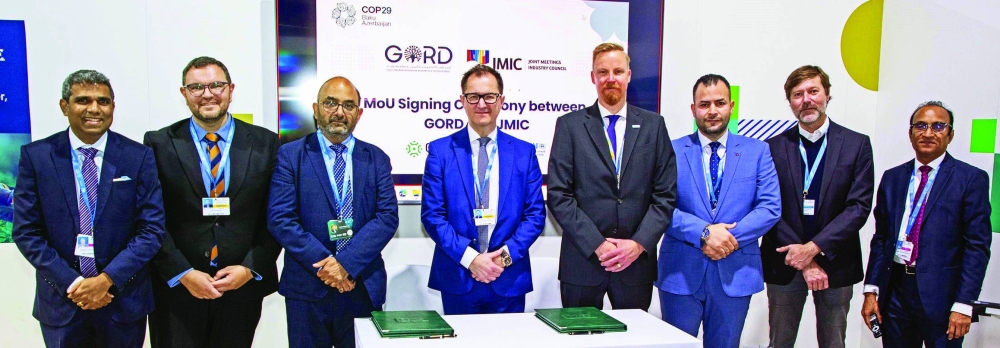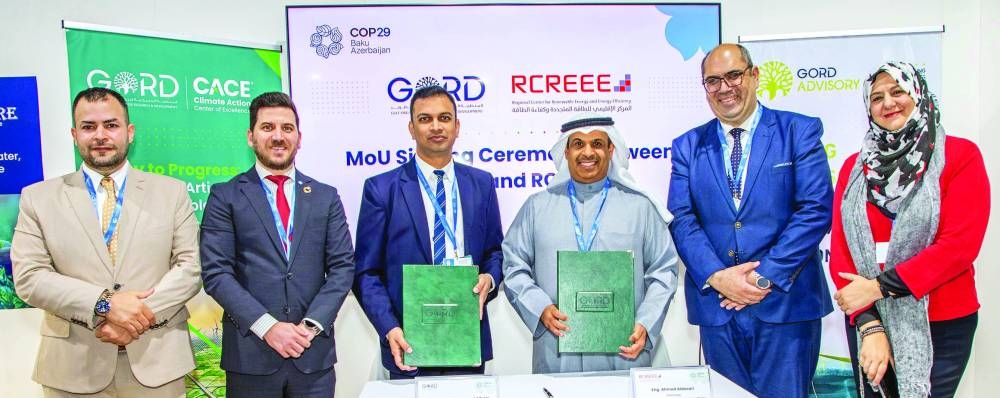The Gulf Organisation for Research and Development (Gord) and its affiliate, the Global Carbon Council (GCC), underscored their commitment to addressing global climate challenges through a series of strategic collaborations with international and regional organisations at the 29th United Nations Climate Change Conference of the Parties (COP29) taking place in Baku, Azerbaijan.
One of the most significant MoUs signed at COP29 was between Gord and the United Nations Office for South-South Cooperation, marking a pivotal step in the effort to foster collaboration across the Global South.
Through this MoU, Gord will play a key role in the South-South and Triangular Cooperation Solutions Lab, a groundbreaking initiative designed to leverage the collective expertise of countries in the Global South, while also incorporating triangular cooperation with the Global North.
The lab aims to accelerate the achievement of the United Nations Sustainable Development Goals by scaling up innovative, locally driven solutions in sectors such as climate action, clean energy, health, and sustainable agriculture.
Dr Yousef Alhorr, founding chairman of Gord and GCC, said: “By joining forces for the creation of the South-South and Triangular Cooperation Solutions Lab, we are continuing our commitment to driving innovation and fostering practical solutions that meet the unique development challenges of the Global South.”
Gord has also entered a strategic collaboration with the Joint Meeting Industry Council (JMIC) to promote the adoption of sustainable event practices, with a specific focus on the Green Events Tool (GET), a web-based tool developed in collaboration with the United Nations Environment Programme and the UN Framework Convention on Climate Change. GET allows event organisers to measure and report the environmental impact of their events, focusing on key areas such as energy consumption, transportation, and waste management.
By joining forces with JMIC, Gord aims to drive the widespread adoption of GET within the events industry and support the Net Zero Carbon Events initiative, which calls for the sector to achieve net-zero emissions by 2050. Through this collaboration, Gord and JMIC will help shape the future of sustainable event management, enabling organisers worldwide to align their activities with the climate goals of the Paris Agreement.
In the realm of sustainable energy, Gord has signed an MoU with the Regional Centre for Renewable Energy and Energy Efficiency. This collaboration aims to accelerate the adoption of renewable energy and energy-efficient solutions across the Mena region. The two organisations will collaborate on a variety of initiatives, including promoting energy-efficient building practices, enhancing the region’s capacity for sustainable energy solutions, and supporting the use of Gord’s Energia Suite software to assess and reduce the carbon footprint of buildings.
“Given the Arab region’s historical reliance on hydrocarbons, it is critical that we embrace a diverse energy future that includes renewable energy and energy-efficient solutions,” said Dr Alhorr.
Gord’s Climate Action Centre of Excellence (CACE)has also signed a memorandum of co-operation with the ministry of environment, agriculture, and livestock in Burundi. This agreement, aimed at developing a robust regulatory framework for carbon markets under Article 6 of the Paris Agreement, marks a significant step in strengthening Burundi’s capacity to engage in international carbon trading.
As part of this collaboration, CACE will assist Burundi in establishing transparent and effective carbon market systems through capacity-building activities, technical assistance, and stakeholder engagement.
The first phase of this project will focus on developing policies and standards to ensure the credibility and integrity of Burundi’s carbon markets, setting the foundation for the country to actively contribute to global climate mitigation efforts.


